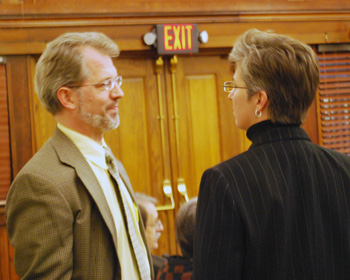Group Explores Road Commission’s Future
At its second meeting since being formed in early October, a subcommittee that’s exploring the future of the Washtenaw County road commission met on Dec. 4 and discussed a variety of issues surrounding one central challenge: How to improve the condition of local roads.
York Township supervisor John Stanowski, center, talks with Washtenaw County commissioner Conan Smith, who represents District 9 in Ann Arbor. They are members of a subcommittee appointed by the county board to explore the future of the road commission. (Photos by the writer.)
The subcommittee was created by the county board of commissioners, which has the authority to appoint the three road commissioners but does not oversee the road commission’s budget or allocation of funds. State legislation enacted last year opened the possibility of absorbing the road commission into county operations, which would give county commissioners direct control over funding and operations now administered by the road commission.
According to the County Road Association of Michigan, five of the state’s 83 counties have merged their road commissions into the county government. Of those, the closest parallel to Washtenaw County in size and demographics is Ingham County, home to Lansing and East Lansing – where Michigan State University is located.
At the Dec. 4 meeting, there appeared to be universal agreement that more road funding is needed, but no clear consensus about the best way to achieve that goal. Conan Smith, a county commissioner representing District 9 in Ann Arbor, noted that there are more options to explore than just leaving the road commission unchanged, or absorbing it as a county department. He said he could almost guarantee that it wouldn’t be the best option to have the county board become the road commission.
However, he argued that there are likely structural and procedural changes that can improve the coordination of countywide transportation planning and land use planning, and to ease the burden on rural townships for funding the maintenance of roads that are used by people throughout the county.
A variety of funding mechanisms were discussed on Dec. 4, including the possibility of the county board levying a countywide road millage under Act 283 of 1909 – which at this point seems unlikely – or putting a millage question on the ballot for voters to decide.
The Dec. 4 meeting drew more than two dozen observers, including two of the three current road commissioners, several township elected officials, and many road commission employees. The subcommittee plans to schedule another meeting for early January 2014, and is expected to complete its recommendations by the end of March.
[Full Story]




